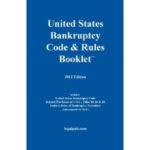The marital settlement agreement that resolves a divorce often divides the debts between the couple. Simple, so far.
But if the agreement includes an indemnification provision, you may have a bankruptcy issue that limits the breadth of the discharge or drives the choice of chapter.
Hold harmless provisions
The typical indemnification provision requires each spouse to hold the other harmless from the debts assigned to that spouse. The indemnity is itself a contingent debt.
And debts (other than support) to a spouse or former spouse incurred in the course of a dissolution of marriage are not dischargeable in Chapter 7. §523(a)(15).
Note, it doesn’t require the debtor to pay the debt; it just requires that the debtor make his former spouse whole if she is sued by the creditor and has to pay it.
So, while the debtor can discharge his liability to the third party creditors on the debts assigned to him in the divorce, his obligation to protect his former spouse from the creditor survives a Chapter 7 discharge.
Indemnification in bankruptcy
This provision recently bit client of mine with a decades-old marital settlement agreement.
The joint credit cards assigned to him had long been paid off and remained unused. But when he hit a rough patch and used the cards to carry him over a business crisis, lo and behold, he had obligated the former spouse whose name, unfortunately, remained on the account.
His discharge in Chapter 7 wiped out his liability to the credit card company, but not his obligation to hold his ex wife harmless for any claims on the joint account.
Marital history may drive choice of bankruptcy chapter
Chapter 13 treats indemnification obligations differently.
The discharge outlined in §1328 does wipe out non support debts to a former spouse.
Whether the debt is a payment to equalize the division of property or an undertaking to hold the other harmless from marital obligations, it is dischargeable in Chapter 13.
The bankruptcy interview
Your intake process needs to identify non support debts to former spouses. Dollars to doughnuts, the potential bankruptcy filer will not know what the settlement agreement or divorce judgment says on the issue of marital debts.
If there is exposure to a former spouse, you’ll need a candid discussion of the risks in proceeding in Chapter 7.
Just one more complexity in the life of a bankruptcy lawyer.









Cathy, §523 says:
(a) A discharge under section 727, 1141, 1228(a), 1228(b), or 1328(b) of this title does not discharge an individual debtor from any debt—
(5) for a domestic support obligation;
(15) to a spouse, former spouse, or child of the debtor and not of the kind described in paragraph (5) that is incurred by the debtor in the course of a divorce or separation or in connection with a separation agreement, divorce decree or other order of a court of record, or a determination made in accordance with State or territorial law by a governmental unit;
It seems to treat chapter 7 and 13 discharges the same regarding both support and non-support obligations to a former spouse. What am I missing here?
You’re missing that 1328(b) is the hardship discharge, not the full compliance discharge.
My ex was awarded a car in pur divorce,..it was repo,d, Then he diler bankruptcy..the creditor was a judgement against me…how do I get him to pay me for bis dębt?